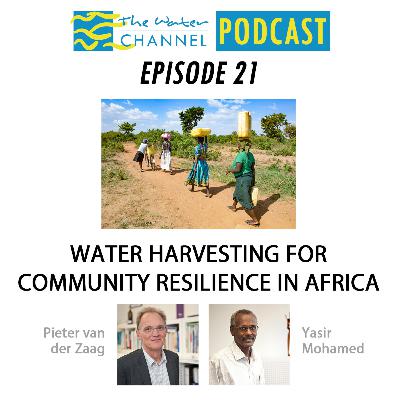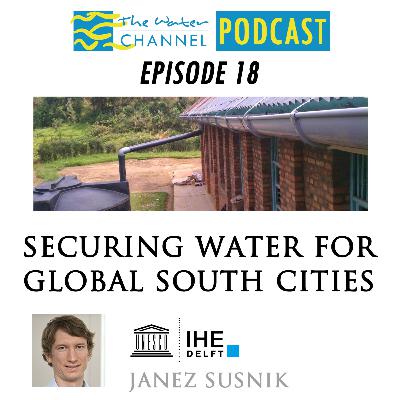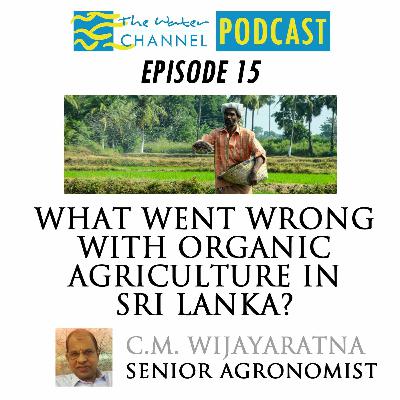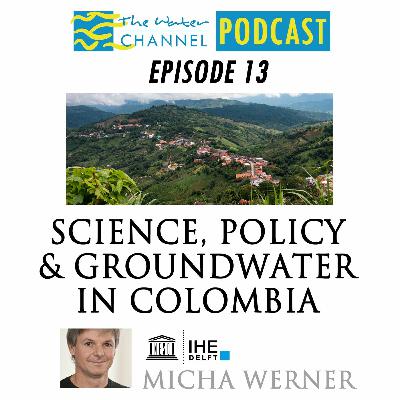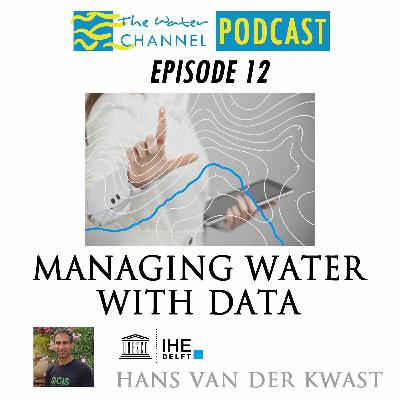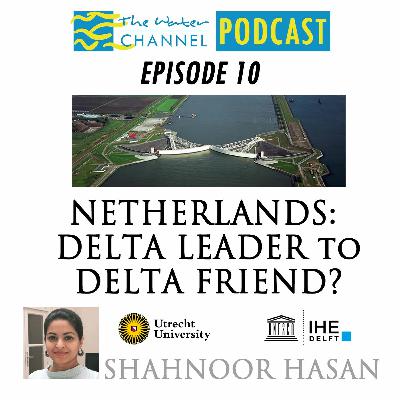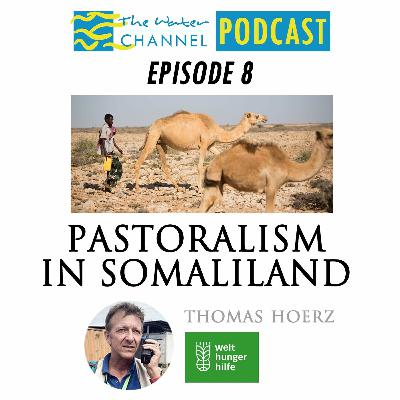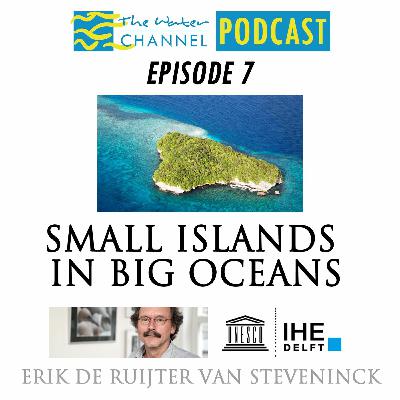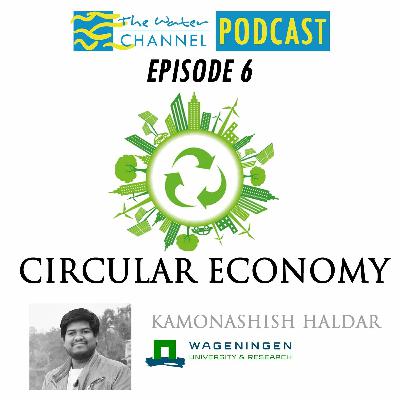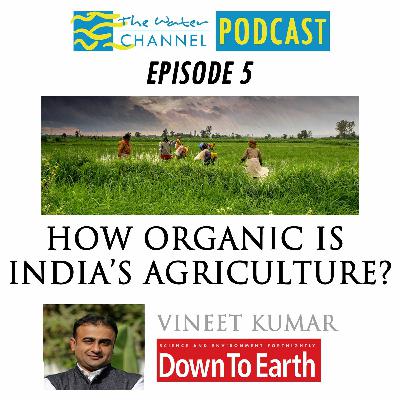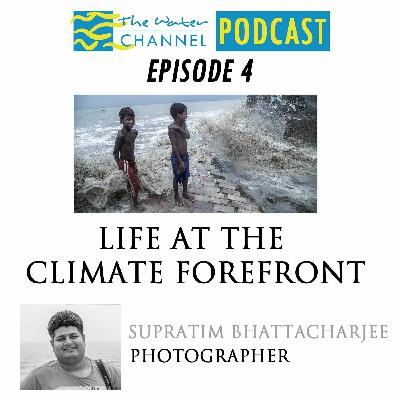Discover TheWaterChannel Podcast
TheWaterChannel Podcast

21 Episodes
Reverse
For thousand years, people have been benefiting from collecting, storing and making productive use of the rain, or water
flows for their crops, animals, or for drinking. This smart idea still has all its beauty in today’s context. We talked to Dr. Yasir Mohamed (Sudan) and Prof. Pieter van der Zaag (IHE Delft, Netherlands) about how water harvesting helps building community resilience in Africa.
Jordan is also in the water world – it constantly ranks top 5 in the list of the most water-scarce nations of the world. Here, every single drop of water counts –
in the most literal sense. We talk to researchers and a policy maker from Jordan, to have a peek into Jordan’s water challenges, and learn what it takes to fight water scarcity. Special thanks to the Water and Development Partnership Programme DUPC2, Dr. Muna Gharaibeh (Jordan Water Authority); Prof. Tariq
Al-Najjar and Prof. Mohammad Wahsha (University of Jordan) and Prof. Maria Kennedy (IHE Delft) for the great support to this episode.
More than a third of Pakistan is under water since mid-June. The floods have left 1500 dead; more than 13,000 injured; 7.6 million displaced. Is this a freak hydrological event, or are we going to see more mega-floods in the future? To what extent are the floods an inevitable effect of climate change, and how much of the death and destruction was down to bad planning, preparedness, and water management? We discuss with Ilyas Masih and Micha Werner (IHE Delft Institute for Water Education, Netherlands) and Khurram Mubeen (MNS University- Multan, Pakistan).
We discuss with IHE Delft's Susanne Schmeier the interlinkages between Water and Peace, and whether conflict can be forecast using data and machine learning
Janez Susnik (IHE Delft) discusses ways to increase the self-reliance and sustainability of cities in the global South with regard to water supply by relieving pressure on traditional sources through the implementation of alternative water systems (for example rainwater harvesting, wastewater reuse, desalination)
The iconic Nile river flows through several countries who often stake competing claims to its waters. IHE-Delft's Emanuele Fantini discusses a project shows that the key to resolving disputes may lie in bringing together scientists, journalists, & artists in a way that dilutes the imperative to look at the the Nile from the perspective of nation-states
Sri Lanka is going through an economic, political crisis. Many associate the island nation's slide to its decision to allow only organic agriculture, in April 2021. Senior agronomist C.M. Wijayaratna explains that this had more to do with the rushed manner of its implementation, and what a pathway out of this crisis could look like
We speak to Martijn van Staveren (IHP-HWRP Committee on Water)on how water science informs water policy, in The Netherlands and beyond.
IHE's Micha Werner talks to Long Hoang about mediating a process wherein scientists and shapers of policy around groundwater in Colombia came together to inform each others' work to a greater extent. Fore more information about the process, please see the website https://sites.google.com/view/e4p-colombia/inicio
Monitoring and managing of water resources is increasingly being done remotely-- using data collected from satellites and drones . Ground level monitoring is often done in ways that involves generation, consolidation, and analysis of vast amounts of data.
What goes on behind this technology? To what extent does all this technology, all this data reach people doing water management on the ground? And how should we treat the vast amounts of data being generated about natural resources that impact us all— who owns it? Who should have access to it? What way of managing it would stimulate most innovation?
Groundwater lies literally buried under layers of soil and rock. It is therefore difficult to monitor, manage, and govern. At the same time, it is a crucial resource: it makes for 98% of all available freshwater on the planet, 50% of all drinking water, 40% of all irrigation water, a third of all water used in industry. In the ongoing Year of Groundwater (2022), an international effort is underway to put groundwater front and centre of policy, research, and practice, to achieve much needed improvement in management and governance of this crucial resource globally.
'Deltas' are landmasses formed out of sediments deposited by rivers at their mouth. Throughout human history, deltas have been cradles of important ports, great cities, key industry, and agriculture.
Deltas are fragile ecosystems; managing them demands much diligence and expertise. Over centuries, The Netherlands has built a reputation of being a key repository of such expertise. It has gone out into the world and offered this expertise to other delta countries; this has been a cornerstone of its diplomacy, trade, and aid.
In this episode, Delta management expert Shanoor Hasan discusses what constitutes 'Brand Netherlands' when it comes to Delta management, and makes a case as to how/why it needs to change.
Even as we tackle droughts, famines, and the need to boost food security for millions, 15% of all food that we grow is being eaten up by rodents (rats, mice, and such). In Sub-Saharan Africa, this figure shoots up to 24%. In Ethiopia, this goes up further--46%--almost half of all the food grown. What is being done to eliminate this gaping hole in our food basket? What can be done further?
We talk to Welt Hunger Hilfe's Thomas Hoerz, on how Somaliland is different than Somalia, how pastoralism sustains millions in arid areas, and how investing in these areas could be key to large-scale carbon sequestration.
Small Island Development States (SIDS) appear on the map as little dots of green in vast stretches of blue. In popular culture, they take turns appearing as idyllic holiday destinations... and as tiny landmasses always on the verge of drowning under rising sea level.
Just how exposed are these island nations to climate change effects? What makes them extra vulnerable? How are they dealing with this threat? We speak to IHE Delft's Erik de Ruiter van Steveninck.
(If you are from a Small Island Developing State--SIDS--here is a fellowship opportunity for you to study water management at IHE Delft: https://www.un-ihe.org/sids-fellowships-1 )
We speak to Dr. Kamonashish Haldar (Wageningen University) about 'Circular Economy,' a model of production and consumption that involves sharing, leasing, refurbishing, and recycling of materials and products. This is not just an ethical choice - in the current scenario of scarce resources and environmental degradation, it also makes good business sense.
After 60+ years of farming based on synthetic fertilizers, pesticides, and intensive water use, Indian farmers are ready to switch to the more sustainable organic methods of agriculture. But there is a lot holding them back. The existing system of subsidies, extension, and market-based is proving too rigid to accommodate those willing to switch to organic. Down to Earth magazine's Vineet Kumar tells the story of this system and those trying to break free.
LINKS:
- ICAR base paper on organic farming: https://www.icar.org.in/files/Base-Paper-Organic-Farming-%20Base-16-03-2015.pdf
- CSE report on state of organic farming in India: https://www.cseindia.org/state-of-organic-and-natural-farming-in-india-10346
Every centimetre of sea level rise is directly felt here at the low-lying Sundarbans – world’s largest mangrove forest, and income sources for millions of local citizens. Lives of millions of people are constantly at risk of coastal erosion, salinization, mega cyclones and flooding. We talk to award-winning photographer Supratim Bhattacharjee about life at this climate forefront. Living next to the Sundarbans, Supratim takes provocative photos to portray climate change impacts, and how the people of the Sundarbans are dealing with them on a daily basis.
This is a production of TheWaterChannel. For more episodes of our podcast, visit: https://bit.ly/3yNQMgn
Visit Supratim’s portfolio: https://www.supratimbhattacharjee.com/
Globally, nearly 7 million people live in refugee camps. Refugee camps are temporary facilities for people on the move, and are built as such-- tents, prefab material, communal taps, and so forth. What about toilets? How does one design, operate, and maintain systems that can catch, store, and treat the vast quantities of poop and piss produced by a dense community.... which is formed quickly and grows rapidly?
Tineke Hooijmans, Assistant Professor in Sanitary Engineering (IHE Delft, The Netherlands)explains the difficulties of this task, and the state of sanitation in refugee camps across the world.
In 2015, Chennai was hit by a major flood, considered to be the worst flood to hit that part of the world in a century. The initial narratives around the flood painted it as an act of nature, an inevitable effect of Climate Change. In months that followed, a federal investigation declared that the flood was a man-made disaster created out of bad water management, lack of early warning, and highly politicized aid and relief efforts.
In this podcast, author Krupa GE recounts the story of chronicling all that in her acclaimed book 'Rivers Remember.' https://krupage.com/


